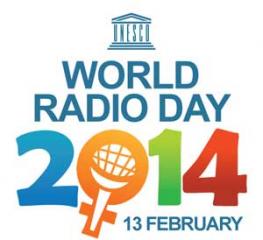
World Radio Day 2014
13 February
World Radio Day seeks to raise awareness about the importance of radio, facilitate access to information through radio and enhance networking among broadcasters.
Radio his recognised as a low cost medium, specifically suited to reach remote communities and vulnerable people: the illiterate, the disabled, women, youth and the poor, while offering a platform to intervene in the public debate, irrespective of people’s educational level.
Furthermore, radio has a strong and specific role in emergency communication and disaster relief. There is also a changing face to radio services which, in the present times of media convergence, are taking up new technological forms, such as broadband, mobiles and tablets. However, it is said that up to a billion people still do not have access to radio today.
On November 3, 2011, the 36th General Conference of UNESCO approved the creation of the World Day of Radio. The initial idea came from the Spanish Academy of Radio four years ago, therefore, the Permanent Delegation of Spain to UNESCO formally present the proposal at the session 187 of UNESCO's Executive Board in September 2011.
Further information is available here.
Facebook comments